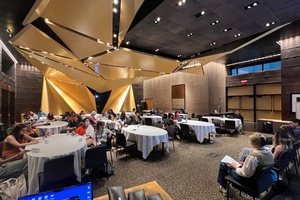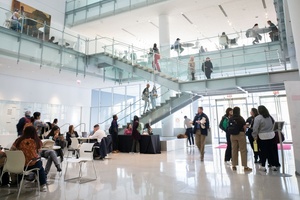Features:
SRCCON Spotlight: Every Day I’m Juggling
Gina Boysun and Justin Myers’ 2016 session on managing managers, peer expectations, and your own project ideas

An overhead view of the SRCCON 2016 coffee and tea station, prime refueling center for the many jugglers in attendance. (Erik Westra for OpenNews)
This year’s SRCCON—our fourth—begins next week. To kick off the run-up to the event, we’re featuring a selection of sessions from last year’s conference, including transcripts and audio when we have them, and brand-new interviews with the session facilitators.
The Session
This session hit upon a topic that’s only gotten more urgent for newsrooms since last year—working on all the priorities, pleasing all the people. It led to some cathartic conversations and a batch of new pro tips for jugglers everywhere.
Notes & Docs
From the session description: In newsrooms of old, jobs were pretty easy to understand (reporters, editors, photographers, illustrators), as were the responsibilities that went with those jobs. But newsrooms still can be old-school, so even if you write and deploy code, you still probably have some non-technical managers and peers. How do you help them better understand what you do? How can you work effectively together and stay on good terms? How do you pitch ideas to them, and how do they pitch ideas to you? How do you communicate about progress, priorities and problems, both on a daily basis and in a crisis?
- Notes taken during the session and conversation
Transcript excerpts:
We can’t just expect it to work or expect that people understand how we work. We have to collaborate. …. And this is mostly to the question of like people coming to you and just saying, like, make it blue or like make it bigger or like build this thing for me. Talking about what the value added is, who is the user, why would your user care, putting the user first and really focusing on why what you’re doing is important and that usually resolves to an understanding of either your thing isn’t important or there’s another issue that you should be solving and there’s a better way to solve it.
…
We were talking about how good management is about being supporting the people who report to you, more than telling them what to do, so much. And that’s something that I think a few of us have encountered managers who see, that they justify that position by making decisions or telling you to do things in a way and trying to figure out how to work around that without creaing a confrontation or bruising their ego, and we talked about maybe just ways of saying yes to the suggestions without actually having to do them. And saying yes, that’s a great idea, and we’re really going to take that on board and coming back maybe with something else that you did that you were always going to do and say how much their idea inspired you and just sort of make them feel like you’re not confronting them, but still they feel important somehow. Which you shouldn’t have to do, but the reality is that bad managers seem to be quite prevalent.
Our Q&A with Gina Boysun and Justin Myers
We caught up with Gina and Justin to talk about how their session unfolded, what kind of preparation they did to make it work, and what they learned from the experience.
Q. What was your session about, and how did you land on that topic?
Our session was about working with other people in the newsroom, especially non-technical managers and peers. Sometimes it isn’t all that clear what we do as developers, designers, project managers and data journalists—so it’s helpful to make sure everyone’s on the same page in terms of expectations and processes.
The two of us came at this from different perspectives: Gina pitched one that focused more on working with managers, and Justin pitched one that was more about staying organized. The OpenNews folks suggested we work together, and we came up with a way to make this session more broadly applicable—and useful, we hope!
Q. What was the session’s structure like?
The session mainly was organized around small groups. We had a brief intro describing the kinds of problems we were wondering about, and then we had groups try to think of some useful situations and suggestions to share with the rest of the room when we regrouped.
Q. What did you cover in the session?
We sort of framed the session in terms of user stories. There were some common types of people we all need to interact with (peers, users, bosses, and so on), so we wanted to get participants’ suggestions for how best to work with them.
Q. Do you remember any specific highlights or surprises from your session or its aftermath?
A few good ones we have in the session notes:
One group simply said the conversation was cathartic. We didn’t really expect that one, but glad we could help!
Several groups suggested doing a better job communicating progress, both to keep stakeholders updated during a project and to help illustrate impact.
It’s important to get to why something needs to get done. People tend to fixate on specific solutions, but first everyone needs to agree on the problem!
Q. Looking back, has the way you think about your topic changed since SRCCON?
Justin: I’ve definitely found myself asking more often about what we’re trying to accomplish, rather than just saying, “Sure, I can do that!”
Gina: I know I definitely took ideas back to our newsroom that were helpful in managing expectations, especially as we underwent a significant change in leadership.
Q. Are there threads from the session that have led elsewhere, that you know of? (Other conference sessions, articles, discussions, etc.)
Justin: I’m not aware of any, but I’d love to be proven wrong. I think these kinds of things tend to be discussed more one-on-one, though, which is OK, too!
Gina: ^^ What Justin said.
Credits
-
Gina Boysun
Reinvented marketing specialist by day. Wife and mom by morning, day and night. Heart eager to serve. I’ve been known to cuss but I love Jesus.
-
 Lindsay Muscato
Lindsay Muscato
Editor of Source from 2015-2020
-
 Justin Myers
Justin Myers
Justin Myers is the news automation editor at The Associated Press, where he helps plan and build tools to help other AP journalists. He’s part of the AP’s data journalism team, and he previously has worked on data journalism and interactive graphics at The Chronicle of Higher Education, The Chronicle of Philanthropy and the PBS NewsHour.



